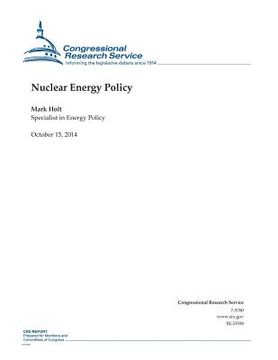Synopsis "Nuclear Energy Policy (in English)"
Nuclear energy issues facing Congress include reactor safety and regulation, radioactive waste management, research and development priorities, federal incentives for new commercial reactors, nuclear weapons proliferation, and security against terrorist attacks. The earthquake and resulting tsunami that severely damaged Japan's Fukushima Daiichi nuclear power plant on March 11, 2011, raised questions in Congress about the disaster's possible implications for nuclear safety regulation, U.S. nuclear energy expansion, and radioactive waste policy. The tsunami knocked out electric power at the six-reactor plant, resulting in the overheating of several reactor cores, loss of cooling in spent fuel storage pools, major hydrogen explosions, and releases of radioactive material into the environment. The Nuclear Regulatory Commission (NRC) issued orders to U.S. nuclear plants March 12, 2012, to begin implementing safety improvements in response to Fukushima. Significant incentives for new commercial reactors were included in the Energy Policy Act of 2005 (EPACT05, P.L. 109-58), such as tax credits and loan guarantees. Together with volatile fossil fuel prices and the possibility of greenhouse gas controls, the federal incentives for nuclear power helped spur renewed interest by utilities and other potential reactor developers. License applications for as many as 31 new reactors were announced, and NRC issued licenses for four reactors at two plant sites in early 2012. However, falling natural gas prices, safety concerns raised by the Fukushima accident, and other changing circumstances have made it unlikely that many more of the proposed nuclear projects will move toward construction in the near term. Four U.S. reactors were permanently closed in 2013, and another shutdown has been announced for late 2014. Three reactors were closed because of the need for major repairs, and the other two because electricity prices fell below their generating costs. DOE's nuclear energy research and development program includes advanced reactors, fuel cycle technology and facilities, and infrastructure support. The Obama Administration's FY2015 funding request for nuclear energy research and development totaled $863.4 million. Including advanced reactors, fuel cycle technology, infrastructure support, and safeguards and security, the total nuclear energy request was $25.0 million (2.9%) below the FY2014 funding level. The House approved $826.7 million (H.R. 4923), while the Senate Subcommittee on Energy and Water Development Appropriations recommended $777.0 million. Disposal of highly radioactive waste has been one of the most controversial aspects of nuclear power. The Obama Administration halted work on a long-planned waste repository at Yucca Mountain, NV, and established the Blue Ribbon Commission on America's Nuclear Future (BRC) to recommend new approaches to the waste problem. The BRC issued its final report to the Secretary of Energy on January 26, 2012. In response to the BRC report, and to provide an outline for a new nuclear waste program, DOE issued a Strategy for the Management and Disposal of Used Nuclear Fuel and High-Level Waste in January 2013. The DOE strategy calls for a new nuclear waste management entity to develop consent-based storage and disposal sites, similar to recommendations by the BRC. No funding has been requested or appropriated since FY2011 to continue NRC licensing of the Yucca Mountain repository, although the House voted to provide DOE with $150.0 million and NRC $55.0 million for Yucca Mountain licensing activities in FY2015.

